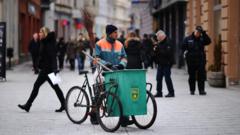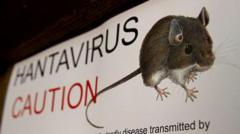In Bosnia and Herzegovina's capital, Sarajevo, alarming reports have surfaced about an overwhelming rodent presence, coinciding with what residents are dubbing the "Year of the Rat." Social media posts are flooded with images of rodents spotted swimming in the Miljacka River, alongside overflowing rubbish bins and illegal waste dumping. The situation has not only frustrated locals but also raised significant health concerns, as the city's public services struggle to manage the crisis.
Health experts attribute the rapid escalation of rat-borne diseases to the unchecked rodent population. In a troubling 24-hour period this week, a dozen cases of leptospirosis were reported by the largest hospital in the country. This rise in infections follows a concerning trend earlier this month, raising alarms about the city's health conditions. The moniker "rat fever" underscores the role that these pests play in spreading the disease, primarily through contaminated water or soil that carries rat urine or feces. Symptoms vary from mild headaches and muscle pain to severe conditions like jaundice and kidney failure.
In response to the growing epidemic, local authorities have enacted emergency measures, aiming for a comprehensive clean-up of public spaces. The city has deployed additional municipal workers equipped with disinfectants and organized additional rubbish collection efforts. Schools have also been instructed to maintain cleanliness in playgrounds and check basements for signs of infestation.
These vigorous actions starkly contrast with the previous two years of inaction due to a flawed pest control tender process that left Sarajevo vulnerable to these health risks. Sarajevo Canton Health Minister Enis Hasanovic has categorized the escalating situation as a "communal crisis," pointing to the failure of local authorities to meet basic hygiene standards. However, concerns linger among experts. Sebija Izetbegović, former director of the University Clinical Centre and now a member of the Sarajevo Canton Assembly, warns that the situation may worsen, potentially introducing threats like hantavirus, as the rodent population continues to thrive unchecked.
Despite the dire circumstances, Sarajevo has yet to face the worst consequences; leptospirosis can be fatal if untreated, with a mortality rate exceeding 50% for severe cases. Fortunately, none of the current cases have escalated to serious levels. It is a stark reminder of the urgent need for effective pest control and public health measures in the city's urban landscape.
















